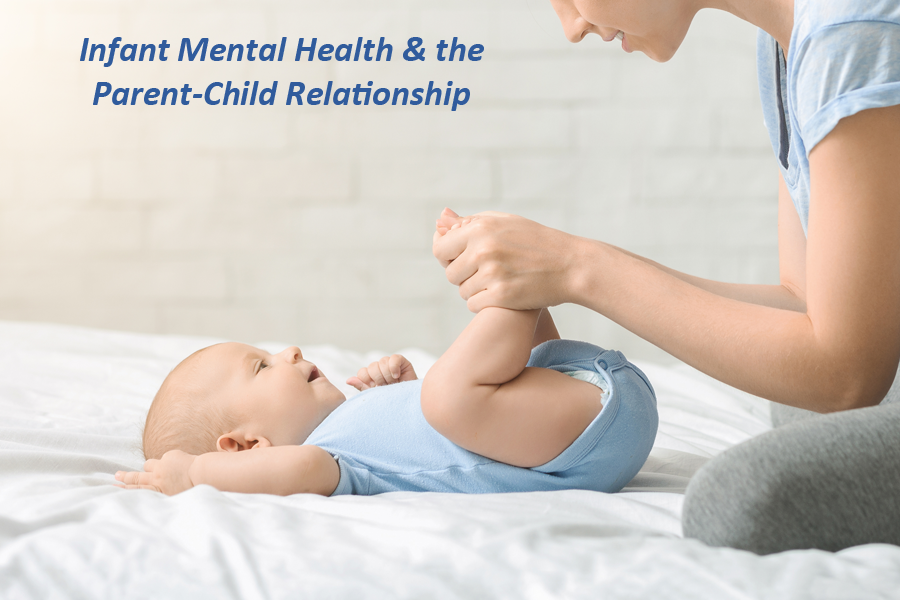
Infant Mental Health & Parent-Child Relationship
Infant mental health focuses on the social-emotional growth of a child within secure and stable relationships. Our children are wired to attach to their caregivers and want to remain close to them, share positive moments together, and ultimately learn from them.
Parents spend hours polling other parents and researching books and magazines about developmental milestones with questions such as, “When should my child be rolling over?” or “How many words should my child have by the age of…”. The most important predictor of future development, however, is not something that can be quantified easily: it is our relationship to our children that is the biggest predictor of a child’s developmental trajectory. So how do we ensure that our relationship is doing the work? Here enters the research and practice surrounding the field of “Infant Mental Health”.
Building Positive Relationships
Positive relationships consist of many great qualities. When a baby cries, a caregiver responds. When a child looks in a direction or points at something, a caregiver follows the pattern of the child’s gaze and often helps label what the child is pointing at. These are all things that build language and cognition, but on a deeper level it is the RELATIONSHIP that allows that to happen. Infant mental health literature talks about “serve and return” as a primary way that infants and toddlers learn about their environment. A caregiver serves information or an interaction, there is a pause, and then a child returns with an reaction to the information or interaction. For example: A caregiver talks to a baby in the sweetest voice saying, “How are you doing”? The baby returns with a gaze, a smile or a coo and the caregiver serves again by continuing a back and forth conversation.
Direct Interaction Works
The fancy “educational toys” cannot hold a candle to the amount of learning your child gets when they are sitting in your lap, hearing a story or seeing you point out an interesting thing on your walks and daily excursions. Vanderbilt University researcher Georgene Toseth found that children learn novel items and concepts quicker when an adult is giving them the information rather than a screen. For toddlers, a flat image of a person on a screen isn’t “real”, so their brains tell them what they are seeing isn’t personally relevant and not something they can learn.1 Relationships serve as the base for future learning. Children learn trust, communication, safety and security. We want our children to grow and it is within our personal connection that children learn more than just words and items. Children reference faces for social cues that are not easily available to them in an online format.
The Field of Infant Mental Health
What does the field of Infant Mental Health offer to support the caregiver-child relationship? It’s more than just “bonding”. I hope your curiosity has peaked at this title and has not immediately jumped to “Oh no. They are diagnosing babies”. In fact, the field of Infant Mental health has grown across the country and within the past 10 years has grown exponentially in the Commonwealth to include more awareness of what infants and their caregivers need in order to THRIVE! The social-emotional health of mother and child is essential to a positive developmental trajectory. Children thrive in positive, safe and stable relationships with their caregivers. This safety and security sets the framework upon which all future development is built. So how do we know if we have good infant mental health with our children and how do we support it?
Learn More
Learn more about infant mental health by visiting The Alliance for the Advancement of Infant Mental Health®, a global organization that includes infant mental health associations who offer the credential: Endorsement for Culturally Sensitive, Relationship-Focused Practice Promoting Infant & Early Childhood Mental Health®.

Article written by Erin Troup, Licensed Professional Counselor specializing in early childhood social emotional needs, particularly attachment, grief & loss, trauma and anxiety. In 2013 after work on a seminal grant supporting postpartum depression, Erin felt there was a gap in supportive counseling and consultation for many young families. She opened her practice: Sprout Center for Emotional Growth and Development, LLC out of the love and passion for supporting children and their families. Consultation, training and supervision are also provided for all agencies and individuals that serve an important role in a family’s life including parents and caregivers, Childcare providers, Educators and Schools, Medical professionals, Legal representatives, Parenting groups and other organizations.
References:
1 https://news.vanderbilt.edu/2019/07/31/toddler-brains-resist-learning-from-screens-even-video-chat/
Read more articles on early childhood development and more at NewMommyPittsburgh.com!
